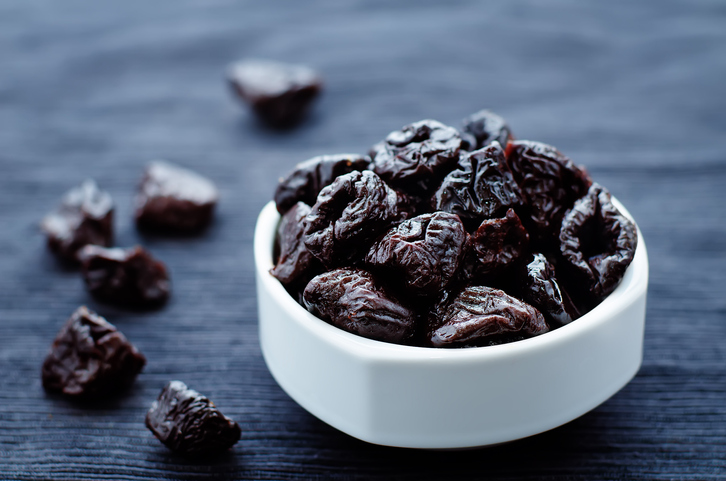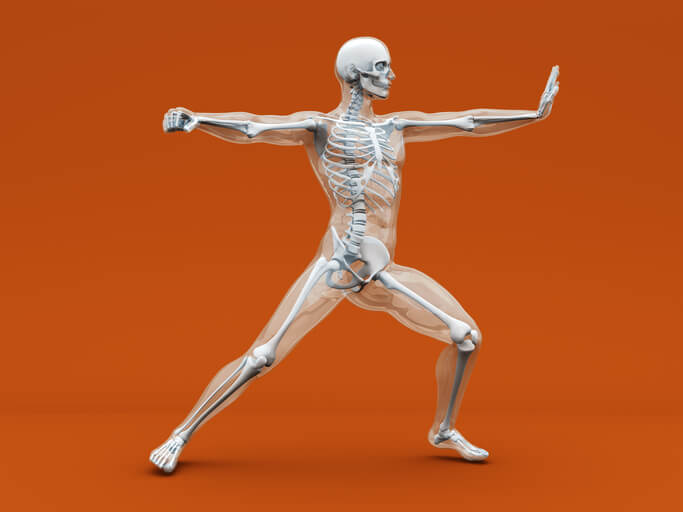Think Prunes Have Only One Health Benefit? Think Again!

By Joy Stephenson-Laws, J.D., Founder
When you think of the health benefits of prunes, one thing – and probably only one thing – comes to mind - constipation relief. This is not surprising since eating prunes is probably one of the best things you can do to keep yourself regular or address an occasional bout of constipation.
Research, however, continues to discover more of how this popular dried fruit (prunes are dried plums) can contribute to your health. To give you some background, prunes date back to ancient western Asia. They eventually spread to Europe and then made their way to the U.S. in the middle of the 19th century. Today, we consume almost a third of a pound of prunes per person, second only to dried dates.
A recently discovered health benefit of prunes is the role they may play in keeping our bones healthy. Given that some 10 million people in the U.S. over the age of 50 have osteoporosis (and this includes men) this is indeed very exciting news!
One study done at Penn State, for example, found that prunes can help or delay bone loss in postmenopausal women. Another showed eating prunes every day helped laboratory animals that had already experienced substantial bone loss reverse these losses. One study even showed that eating about 10 prunes a day for a year improved bone mineral density of bones in the spine and forearm.
While researchers are still studying what it is about prunes – or their wealth of nutrients – that may help maintain bone density, various studies have shown a link between inflammation and oxidative stress and bone loss. This loss occurs after the age of 40 since this is when our bodies start removing old bone faster than it can replace it with new bone. While there are many causes of this imbalance, oxidative stress and inflammation have been shown to be two of them.
The theory is that specific foods, such as prunes, that can reduce inflammation and oxidative stress may promote bone health. And there are studies that support the effects of antioxidants on bone density. With postmenopausal women, for example, hormonal changes can increase oxidative stress and inflammation which can increase their risk for loosing bone density. In one study, researchers also found that their blood plasma had lower levels of antioxidants. This group, not coincidentally, also had the highest risk for osteoporosis. Plant-based antioxidant supplements taken under the direction of a competent healthcare practitioner may also potentially support bone health.

One way that prunes may reduce inflammation and oxidative stress is by promoting a healthier gut microbiome. In one recent study, researchers explored the effect of prunes on gut microbiota. For four weeks, participants were randomly assigned to one of the three regimens listed below:
- 80 grams of prunes (which is about eight prunes) along with 300 milliliters of water (a nutrient that also helps prevent constipation) per day
- 120 grams of prunes and 300 milliliters of water per day
- No prunes and 300 milliliters of water per day (the control group)
Basically, the results revealed that compared to the control group, the prune groups had higher amounts of Bifidobacterium in their guts. “Members of the genus Bifidobacterium are among the first microbes to colonize the human gastrointestinal tract and are believed to exert positive health benefits on their host. Due to their purported health-promoting properties, bifidobacteria have been incorporated into many functional foods as active ingredients,” reports the National Institutes of Health (NIH).
In addition to supporting your bones, having a healthy gut can also positively impact your mental health, weight, immune function, ability to absorb nutrients from the foods you eat and overall digestive health and even the risk of developing cancer.
Along with promoting bone and gut health, there are many reasons for you to include prunes in your nutrition arsenal. Among them are:
- Being rich in a variety of vitamins and minerals with a one ounce serving (about 3-4 prunes) having:
- Vitamin A – 4 percent of the RDI
- Vitamin B2 – 3 percent of the RDI
- Vitamin B3 – 3 percent of the RDI
- Vitamin B6 – 3 percent of the RDI
- Vitamin K – 21 percent of the RDI
- Copper – 4 percent of the RDI
- Magnesium – 3 percent of the RDI
- Manganese – 4 percent of the RDI
- Phosphorus – 2 percent of the RDI
- Potassium – 6 percent of the RDI
- Possibly lowering blood sugar
- Possibly supporting heart health by lowering cholesterol and blood pressure
Prunes also have fiber and protein. Keep in mind, however, that they should be eaten in moderation since this same one ounce serving has 67 calories and 11 grams of sugar. If you snack on them throughout the day, you could easily overshoot your daily caloric and sugar goals.
Prunes are more versatile than you may have thought. In addition to snacking on them (I take a few with some healthy nuts with me on my hikes for energy), you can also add them to salads and smoothies, use them to make prune jam, enjoy them with your hot breakfast cereals and add them to breads and other baked goods. Many people also like stewing them and serving them as a side dish or even as a dessert.
Other Foods That Can Help Keep Your Bones HealthyFruits and vegetables with antioxidants such as phenolic acid, flavonoids, and carotenoids, may improve bone mineral density and protect you against frail bones. One study found a link between an antioxidant-rich diet and lower incidence of osteoporosis among postmenopausal women. In one study, women who ate more than nine servings of plants high in antioxidants had decreased bone turnover (which is when the body breaks down and makes new bone).
And others suggest that eating fruits and vegetables in childhood gives a good indication of bone mass. For example, it was found that children who ate at least three servings of fruit and vegetables a day had more whole-body bone area than those consuming fewer than three servings. This is important since the childhood, teen and young adult years are when our bodies develop bone mass.
Examples of other foods that may support bone health include fatty fish, pomegranates, citrus fruits, potatoes, legumes, almonds, fortified orange juice, tofu, figs and soybeans. And if you are “mature,” definitely think about adding onions and garlic to your diet since one study found that women who ate onions every day had five percent more bone density than those who ate them once a month.
Other steps you can take that may support bone health by reducing oxidative stress include:
- Lay off the junk foods – Excessive junk food can increase inflammation and oxidative stress
- Decrease toxin exposure – Xenoestrogens (chemicals that imitate estrogen), pesticides and heavy metals can increase oxidative stress
- Exercise in moderation – Although exercise is generally very healthy, excess strenuous exercise can increase oxidative stress
If you are wondering if you are getting enough antioxidants in your diet, you can check for many specific antioxidant levels with a simple blood test. This would be a great complement to nutrient tests to see if you have any imbalances or deficiencies.
Enjoy your healthy life!
The pH professional health care team includes recognized experts from a variety of health care and related disciplines, including physicians, attorneys, nutritionists, nurses, and certified fitness instructors. This team also includes the members of the pH Medical Advisory Board, which constantly monitors all pH programs, products, and services. To learn more about the pH Medical Advisory Board, click here.







